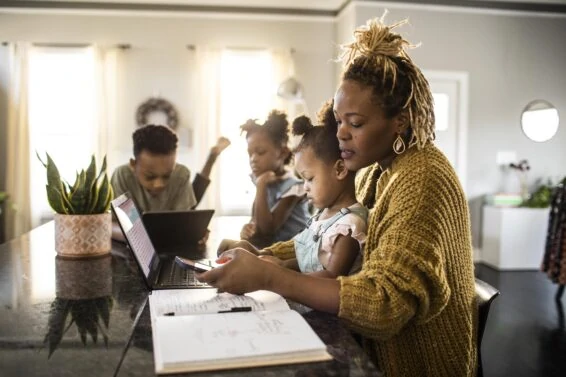Your Genesys Blog Subscription has been confirmed!
Please add genesys@email.genesys.com to your safe sender list to ensure you receive the weekly blog notifications.
Subscribe to our free newsletter and get blog updates in your inbox
Don't Show This Again.

The COVID-19 pandemic has left a mark on all of us. And as we reflect on Women’s History Month, it’s important to explore how it has specifically affected women. In addition to amplifying pre-existing struggles, the pandemic brought new challenges for working women.
It’s important to start conversations now. In this blog, we share the stories of two admirable women in tech and see common themes we can all learn from as we adapt and emerge stronger from the pandemic.
Expanded Responsibilities
Like most parents, Rania Salloum, Sales Development Representative in Canada who started with Genesys at the beginning of the pandemic, saw the worlds of work and home collide. As a single parent, responding to her children’s needs throughout the day meant longer hours in the evening.
“Work was broken up into little sequences, and you end up working a bit later to make up for the time you’ve lost during the day because of interruptions,” said Rania.
While everyone had limited contact since the beginning of 2020, this was particularly pronounced for single parents like Dominique Field, a Marketing Director for Genesys in Australia. The natural opportunities to connect with co-workers just weren’t there anymore. For Dominique, this became even harder as she juggled primary caretaker responsibilities alongside her growing workload in digital marketing. This meant the space for “natural and fun” conversations with other adults shrank considerably both inside and outside of work.
Both Rania and Dominique had new titles to add to the list: teacher and tech support. Not home schooling, but school at home, brought a whole new world of Zoom classes and online homework. These responsibilities, along with the traditional view that women are expected to be primary caretakers of children or aging relatives, further expanded the burden on women in the workplace.
Coping with Hidden Effects
Dominique’s creativity in digital marketing extends to her personal life. When COVID-19 first hit, she realized she didn’t have many hobbies but quickly adapted to find ways to spend her time. Specifically, she took up bushwalking to give her and her dogs a place to go when they all needed to get out of the house. She also remained intentional about staying in touch with her friends and family to maintain those healthy relationships that help ward off feelings of isolation.
Rania is no stranger to challenges, but her cheerful demeanor serves her well as she approaches work with a positive attitude. Still, at times, she felt the emotional impact of being at home as the only adult in the house. Being on calls with adults during the day — but having only kids around in-person — wasn’t the same as experiencing those adult relationships in real life. So she looked for creative ways to “Stay positive and see the end of the tunnel that COVID brought on,” she noted.
Dominique and Rania’s resilience is encouraging; they both found ways to cope with — and grow —during the pandemic. Yet, their challenges are similar to those of many other women in the world. According to a global McKinsey study of 65,000 workers during the pandemic, women experienced more burnout, stress, exhaustion and pressure to work than men.
It’s critical to find ways to mitigate these challenges and go into 2022 stronger.
Growing Stronger Together
To carry on lessons learned from the pandemic, Rania and Dominique both encourage women to be bold — to speak up and reach out.
Dominique described how the Genesys culture supported her during the pandemic. “When everything was falling apart, work wasn’t, because I love work. I love my job. I love having a goal and trying to achieve it and working with other people who were doing the same, so work was like a constant for me.”
Building an environment that fosters these behaviors takes intentionality. When done right, companies create shared purpose — founded on empathy for the employee experience.
Subscribe to our free newsletter and get blog updates in your inbox.